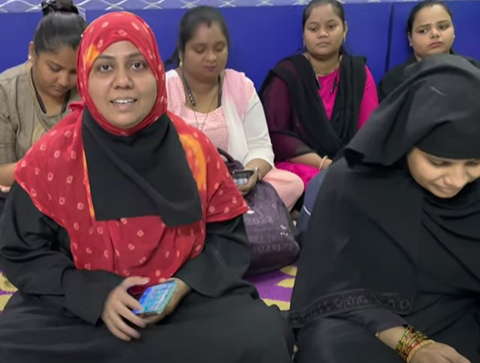FMCH (www.fmch-india.org) works to improve maternal health and combat malnutrition through a systems approach, collaborating with government services, families, and community leaders to drive behavior change in under-resourced communities in Mumbai and Bengaluru.
By focusing on nutrition counseling and data-driven interventions, they have empowered over 100,000 families, improving birth weights to 2.7 kg, increasing breastfeeding rates by up to 70%, and preventing malnutrition. Their impact extends to over 500,000 people in Maharashtra, and they work with more than 10 partners across India.
Creating a Scalable Mother & Child program by Digital Transformation of the Field Workers Operations
- Implementation of NuTree app has ensured higher quality of interventions, with fewer instances of missing key questions and lesser missed visits paving the way for a plug-and-play adoption model.
-
This results in improved program outcomes
- Successful transition of 77% of SAM/MAM children to a healthy state
- Threefold increase in the number of families reached
- Reduction in missed visits for high-risk mothers from 58% to 37%
- Significant improvements in Infant and Young Child Feeding (IYCF) practices.
FMCH programs focus on in-depth engagement with pregnant women and mothers of new-born and young children to reduce infant mortality, improve maternal health and nutrition of mother and child. This is achieved through regular home visits for counselling the mother based on the stage of pregnancy or age of the child.
There was a need to support the field worker in delivering consistent high quality counselling in a timely manner. This became even more critical as the organization scaled and added more partners across India, ensuring adherence to schedule.
In addition, there was a need to collect, track, analyze data and keep track of high-risk cases which need special and timely attention.
We developed the NuTree platform, a comprehensive scheduling, counselling and decision tree solution to support the frontline worker and achieve the above objective.
NuTree has been designed to provide multilingual support to enable easier adoption by field workers. It also works offline, enabling ease of use in areas of low intenet connectivity.
- Field workers supporting maternal and child health face challenges in delivering timely information and maintaining protocol adherence during interactions with women at various stages of pregnancy.
- NuTree app offers structured counselling support through customizable workflows and decision trees, tailoring questions based on pregnancy stage and child age.
- A distinct flow is available for counselling high-risk SAM/MAM cases
- The app ensures consistent protocol adherence by guiding field workers in asking the right questions and recording visit data.
- Each field officer supports around 200 families, facing challenges in efficient daily visit planning due to volume of data along with variables like high-risk cases and home distances.
- Nutree’s scheduling feature prioritizes mothers for visits based on factors such as last visit date and mother/child condition, including high-risk or SAM/MAM cases, aiding officers in daily planning.
- Field officers can cancel and specify reasons for the missed visits.
- This streamlined scheduling process has enhanced field officer productivity, reduced operating costs and doubled the families reached, by threefold with a 20% decrease in missed visits.
- Children with severe acute malnutrition (SAM) and moderate acute malnutrition (MAM) require specialized attention and more frequent visits, meriting a distinct decision tree protocol with questions tailored to care of SAM/MAM condition.
- NuTree's SAM/MAM protocol helps the field officers classify children based on malnutrition severity, prioritize visits, cancel or reschedule visits, and specify reasons for missed visits.
- The protocol has optimized care, enabling timely interventions; post the implementation of protocol, FMCH improved 77% of SAM/MAM children to healthy status.
- Field officers conduct Pregnancy Club (PC) sessions for educating mothers on pregnancy expectations and Nutrition Course (NC) sessions on optimal eating and feeding practices during the first 1000 days.
- Evaluating the impact of these programs on community nutritional milestones was challenging.
- NuTree's PC/NC feature equips officers with tools for session organization, content dissemination, and knowledge survey administration.
- The feature enhances program monitoring and evaluation, leading to more effective nutrition interventions and improved community health outcomes.
When we first started developing the app, we envisioned it be a simple decision tree app, to go along with the current system we had been using – solving the problem of quality at scale. However, multiple meetings with the very patient Koita Foundation team led us to think deeply about how technology will connect to us to our vision – making it more than just an app for one function.
Now the NuTree App solves the issue of quality of counselling for nutrition in the first 1000 days of a child’s life, is an accountability and part scheduling mechanism and can be easily used to disseminate resources to the mothers (videos, audios and other IEC material). It is almost like an all-in-one resource for any health worker in MCH. Using the app has led to the connection between us and the communities to strength more easily – in many ways.
It’s been a great learning working with Koita Foundation. Rizwan and Rekha’s constant focus on the end user has made the app so intuitive that we rolled it out during the lockdown despite which, adoption has been easy. The software partner, Designscape, has thoughtfully designed the backend to be modular and to be taken to any context. We are excited about the possibilities this holds for more mothers – directly via FMCH operations and though partnerships.
Ms. Shruthi Iyer
CEO of Foundation for Mother and Child Health

